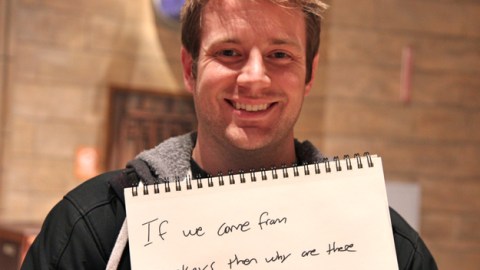No Snark, No Sarcasm: How One Scientist Engaged Creationists

“If all you do is mock the people who disagree with you, you miss your chance to honestly engage with them, learn about where they come from, and — just maybe — teach them a little piece of something that they might not have known before.”
This is what Ethan Siegel, of Starts with a Bang! wrote in response to a Buzzfeed post that featured a series of questions from creationists, all inspired by — you guessed it — Bill Nye’s debate with Ken Ham of the Creation Museum in Petersburg, Kentucky.
Despite being an astrophysicist, not a biologist, by trade, we love the spirit in which Siegel provided answers to some of the questions, which we have sampled from below.
How do you explain a sunset if [there] is no God?
I think this is an outstanding question. How can you explain the sunset, in all its beauty, without appealing to the divine?
…But this is something that science can explain quite wonderfully, including the different colors, gradations, atmospheric effects and visual illusions. To me, at least, everything is more beautiful the more you know about it.
If God did not create everything, how did the first single-celled organism originate? By chance?
This is a question where I’m proud to say “I don’t know.” Because it’s true: I don’t, but perhaps someday we will! You are asking one of the biggest questions of all: how did life come to exist in this world? And the answer is that — right now — we don’t know.
Because science is by definition a “theory” — not testable, observable nor repeatable, why do you object to creationism or intelligent design being taught in school?
Let me personally be clear: I think that creationism or intelligent design has every place in a classroom on literature, politics or social studies, just not in a science classroom. Why? Because it isn’t a scientific theory.
…Scientific laws can tell you what’s going to happen under certain conditions, but they haven’t yet advanced to the point of a scientific theory. You see, a scientific theory is even more advanced than this, and posits an explanation and/or a mechanism from which scientific laws arise. And that’s where science can really show off its true power.
Read more here.
Image credit: Matt Stopera / Buzzfeed




